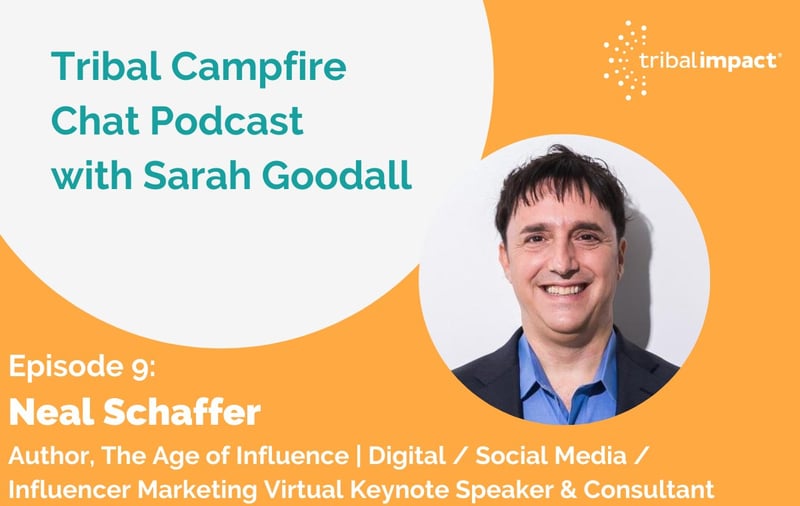
Neal Schaffer: The Age Of Influence & Social Business
Today I'm talking to Neal Schaffer. Now, Neal is a digital and social media marketing speaker and consultant. In all honesty, he's an absolute legend, and I've been following his content for many years. Neal has a truly global perspective when it comes to social networking and he's written several books including the recently released The Age of Influence. I am absolutely delighted to have Neal join me for a Campfire Chat.
Being Sticky And Relatable Builds Influence
I'd noticed that Neil had recently shared his incredible life stories, such as having two near-death experiences and a life-changing experience in Tiananmen Square
Neil explained that he'd decided to share some of his life stories as he was writing his book on the concept of influence on digital and social media, he realised that people relate more to people than to brands. So if that was the case, what was he doing with all these brand names he’d built when he should just be Neal Schaffer?
“I think the stickier we as people can make ourselves in social media, in digital media, the more relatable we become, and the more we are able to build influence, so I actually want to bring out more of who I am.”
While a lot of people talk about their families, Neil’s wife told him she didn’t want to be a part of it and he shouldn’t include the kids. But Neil believes there’s still a way to create a public persona, and be yourself, and open up yourself, without having to expose all of your private interests. That's what he’s done.
Cultural Differences In Social Media
Neil can speak Mandarin Chinese and Japanese fluently and has worked in Japan and studied in China. So I wanted to know his take on what - if any - are the cultural differences on social between Asian and Western cultures?
Neil told me that he believes we’re now in the second decade of social media marketing. It’s no longer dismissed as “just an American thing”, but is now truly global. It’s just that the choice of social networks is going to be slightly different depending on the country.
Neil’s experience has shown him that every culture will differ slightly in how they use social media. In North America and Europe, Western Europe especially, it's very similar. But in Southeast Asia Facebook is used more like LinkedIn. When he's had a business meeting in Japan, he'll often then receive a Facebook friend request!
"And really, The Golden Rule is you've got to be embedded in that culture and really understand it and become a user before you can begin to sort of preach as to what people there should be doing. That's always been sort of my doctrine, my mantra."
The Age Of Influence
Neil believes that influencer marketing is similar to how companies dismissed social media marketing as just a fad back in 2010. Companies dismiss it as being just about “paying off” influencers on Instagram. But they’re not even active on there so they can’t see how mainstream it’s become, how advertising on it can be disruptive and how influencers are really good content creators.
Companies should start by asking what they can do to get the word out about themselves. With organic search and organic now becoming “pay to play” and so much more expensive and competitive, doesn't it make sense to find other ways? Many start-ups bypass all the other channels and use influencer marketing to generate word-of-mouth marketing because no-one's talking about them.
Neil pointed out:
“You're already probably paying off influencers when you're paying off other companies, whatever money it is, to embed a link back to your website for SEO.”
Neil said that companies shouldn’t think about creating a relationship with influencers to amplify their content but where they can create content for them. Why wouldn't you want to work with influencers who are experts at creating the content, instead of outsourcing content creation to people that have no influence?
When looking for influencers, Neil emphasised that you want to work with the more authentic people, obviously that care about their community and resonate with your brand - not the ones that are controversial and add no value. Because their audience doesn’t care if they’re being paid - they expect them to make a living creating content - so long as they’re giving value.
Are Employees Just Sharers, Not Influencers?
I told Neil that I’d read a very opinionated article the other day saying employees are just content sharers and not influencers. They have no right to become influencers as they're biased and not the most trusted voice according to the annual Edelman's Trust Barometer- the company's technical experts.
Neil believes it simply comes to this: Do they influence their followers? Do they force people to change their minds about things or to be interested in things they weren't interested in earlier?
Neil said influencer marketing's moved from micro-influencers to nano influencers - ones with 1,000 to 5,000 or 10 000 followers (although some look to those with as little as 500).
There are studies that have shown that those that have less than 1,000 followers, in general, get higher engagement than those that have a lot more. So Neil said that companies should focus on finding that 0.1%, the 1%, the 5% of employees that are active on social media with 500-1000 followers. They then need to invest in their employees by thinking about how their social media training and programme can help their needs and motivations.
"It's about trusting people that we can relate to, and we relate to people, not brands….As much as brands want to become better brand storytellers or humanise the brand, they're not human."
The Social Business
Neil shared that seven, and eight years ago, he was talking getting to a point where social media permeates the enterprise. At that point, Dell used to have a separate social media division. That's no more. Every department is now using social media.
Neil believes that we’re going to see more and more companies creating these programs for influencers as they see the impact it has on social selling. And that slowly we’ll start to see a marriage of the external influencer and the internal influencer.
“I believe, at the end of the day that, when I talked about social business, and my original definition, how it permeates the enterprise, we’ll begin to see more and more business decisions actually be influenced by social media, because it does become the ultimate public focus group.”
Neil warned that if companies truly want to get everybody on board, it starts at the top - with the CEO having a voice, and being out there, and engaging with people on social media. And that can be done without taking up a lot of the CEO's time, using voice recorders and editors to create content that reflects their voice. And doing so reap benefits for your brand in so many different ways over time.
The Episode:
[02:14] Being Sticky And Relatable Builds Brands
[05:24] Cultural Differences In Social Media
[10:50] & [27:46] The Age Of Influence And Choosing Influencers
[20:27] Are Employees Just Sharers, Not Influencers?
[30:34] The Social Business
Resources:
-
The Age of Influence: The Power of Influencers to Elevate Your Brand
- Neal Schaffer on Pinterest
- Neal Schaffer on Instagram
- Neal Schaffer on Facebook
- Neal Schaffer on YouTube

